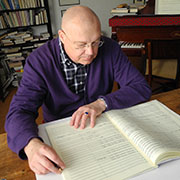In Salzburg and Paris premieres of two works by Manfred Trojahn will be given on two consecutive days in March 2016: Four Women from Shakespeare for soprano and ensemble at the Salzburg Easter Festival and the ensemble work Nocturne – Minotauromachie in Paris.
Feminine character nuances
In his two new works Manfred Trojahn builds on key aspects of his output: the cycle Four Women from Shakespeare, written in spring 2015 to a commission from the Salzburg Easter Festival, focusses on the subject of Shakespeare and on his “instrument”, the female voice. “This preoccupation with Shakespeare’s figures”, says Trojahn, “firstly in the opera Was ihr wollt [As You Like It], written for the Munich Staatsoper, has never left me, and so, in this new piece, I’ve tried once again to draw closer to these female characters whom I so love.
Here very different, contrasting characters are now found together in close proximity, demanding a tremendous versatility from the singer. Titania’s monologue from A Midsummer Night’s Dream, a reproachful diatribe which describes the consequences of the quarrel between her and Oberon, who – in the piece – can then only answer very laconically and briefly; Juliet’s encounter with Romeo in which she declares her love tenderly, bashfully, but with compelling purpose; the traumatised Ophelia, who in her despair doesn’t leave out the scurrilous; and finally Lady Macbeth, who becomes almost self-beseechingly obsessed with her desire for murder.” The ensemble chosen of flute, clarinet, harp and string quartet gives Trojahn the colours necessary to describe the different nuances of the characters. “Together with a piece from earlier years, the Frammenti di Michelangelo for soprano, twelve wind instruments and double bass, the Four Women from Shakespeare are intended to show off the wonderful possibilities of the female voice which I, as an opera composer, love above all others.”
Assimilating a myth
The ensemble piece Nocturne – Minotauromachie belongs intellectually and musically to the context of his compositions based around René Char. A nocturnal-mythical contemplation for large ensemble, the idea of which is manifested in a double title: “Of course ‘Minotauromachie’ is a term which describes the fight between Theseus and the Minotaur. But I’m referring to the print by Picasso which lends a biographical and nocturnal aspect to the scene and which no longer features Theseus. This is not about a description of a mythical situation, but about a spacious interpretation and assimilation of myth. And it’s like this with my new piece, which to all intents and purposes belongs in the context of the Char compositions Quitter and une Campagne noire de soleil.”
Marie Luise Maintz
(from: [t]akte 2/2015)



